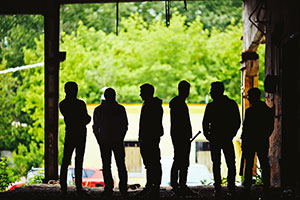Comtech Telecommunications Corp. is an American company that makes satellite ground stations. It had planned to merge with an Israeli company, Gilat Satellite Networks Ltd., that makes in-flight entertainment systems.
Comtech called off the merger after the pandemic caused a sharp loss in Gilat’s revenues. Gilat took issue with Comtech’s claim that the merger agreement allowed it to back out of the deal because Gilat had suffered a “material adverse effect.” Gilat sued Comtech in the Delaware Court of Chancery to enforce the contract.
The case settled on the eve of trial. Before the settlement, however, the parties argued about whether expert reports should be admitted into evidence or excluded as inadmissible hearsay. The court decided to admit the reports of testifying experts as substantive evidence.
Chancery Court
Chancery Courts are generally limited to awarding equitable relief to parties. Most states give judges the authority to preside in common law cases involving damages and in cases that seek equitable remedies, such as injunctive relief.
Chancery Courts are no longer common in the United States. The Delaware Court of Chancery traces its lineage to 1792 and has its roots in the High Court of Chancery of Great Britain.
Since jury trials are unavailable in Chancery Court, judges may be inclined to receive expert reports without worrying that a jury might be tainted by inadmissible content. The presiding judge in the Comtech case observed that “parties typically agree to admit the reports of testifying experts in Chancery as a means to streamline (and focus) the trial presentations.” Noting that expert reports are helpful to the Chancery Court, the judge encouraged that practice. Still, since the parties to the Comtech case did not agree, the court needed to decide whether, under Delaware law, an expert report is inadmissible hearsay.
Hearsay Rule and Expert Reports
Hearsay is almost universally defined as a statement not made by a testifying witness during a trial that is offered into evidence to prove the truth of the statement. An expert report is prepared before trial and is therefore not a statement made during trial testimony. Lawyers who seek admission of reports offer them to prove the truth of facts and opinions asserted in the report.
Expert reports therefore fit the definition of hearsay. It is, in fact, common for courts to rule (as a New Jersey court recently decided) that expert reports are hearsay and not admissible. The Chancery Court noted that Delaware’s Superior Court (the court that hears most civil disputes in Delaware) takes the position that expert reports are hearsay.
Not all hearsay is inadmissible. Every state has adopted, either by rules of evidence or judicial opinions, a variety of exceptions to the hearsay rule. In addition, certain out-of-court statements are excluded from the definition of hearsay. Prior statements made by a testifying witness are typically excluded, but only when they are offered against the party that called the witness.
Experts can testify about the same facts and opinions that are contained within the report, even if the report itself is inadmissible. The expert’s testimony (assuming it meets other criteria of admissibility) is evidence, but the prevailing view is that expert reports are “merely discovery materials” that are not themselves evidence.
Admissibility of Expert Reports in Chancery
Chancery Court, while subject to the same rules of evidence as other courts, is a different animal. The Chancery judge in the Comtech case decided that expert reports should be admissible and that opposing parties should be free to cross-examine experts about information and opinions stated in their reports even if the experts don’t testify about those facts and opinions on direct examination.
The judge admitted that his decision was “detached from the rules of evidence.” The court rejected the idea, advanced in an earlier Chancery decision, that expert reports are not hearsay when the expert is subject to cross-examination about the report’s contents. The earlier decision concluded that the expert “essentially made the challenged statements [in his report] while testifying,” a bit of sophistry that defies reason. As the judge in the Comtech case noted, a report that is written at an expert’s desk is not magically teleported from the desk to the courtroom simply because the expert testifies.
Anxious, however, to gain the time-saving advantage of admitting the report, the judge relied on the residual hearsay exception to justify its admission. The residual hearsay exception arguably allows all kinds of out-of-court statements into evidence if a judge regards them as “trustworthy.”
The residual hearsay exception has been criticized as swallowing the hearsay rule. The exception is difficult to apply to expert reports because they may or may not be trustworthy, and their trustworthiness can’t be determined until the expert testifies and is cross-examined. Admitting the report before that cross-examination occurs seems to stand the exception on its head.
In the end, the judge decided that no party in the Comtech case would be hurt if he considered the reports and admitted them because he expected them to be useful. In cases tried to other courts, parties might generally expect expert reports to be treated as a discovery tool and not as admissible evidence to prove a party’s claim.




